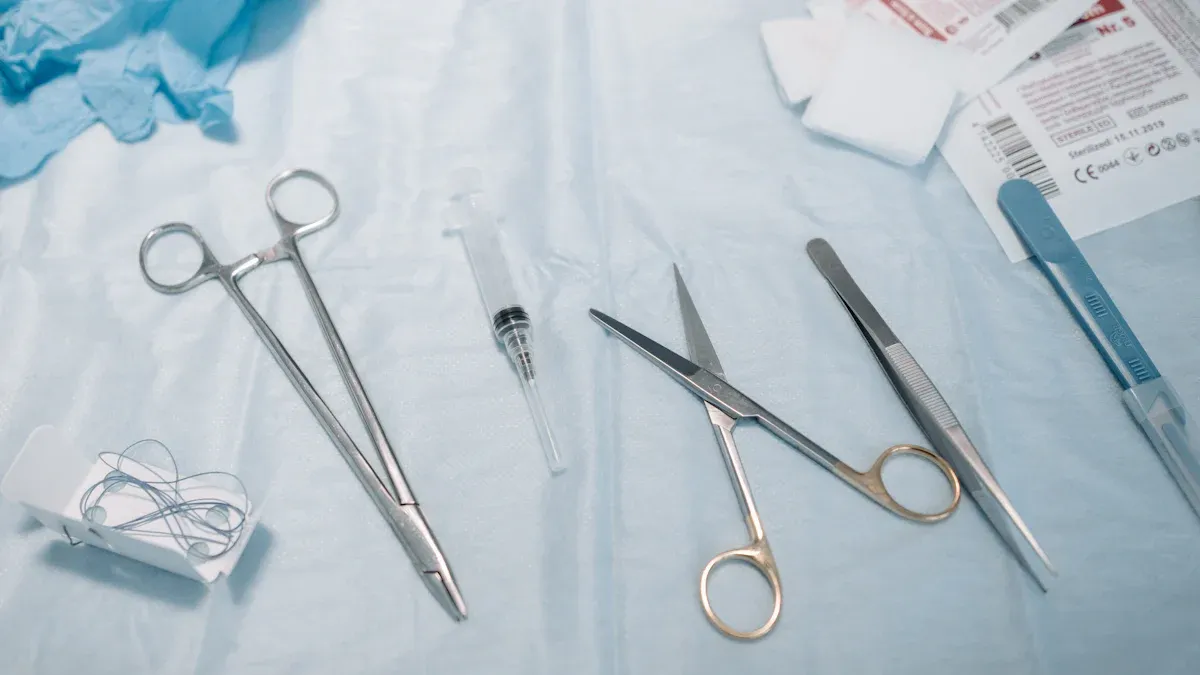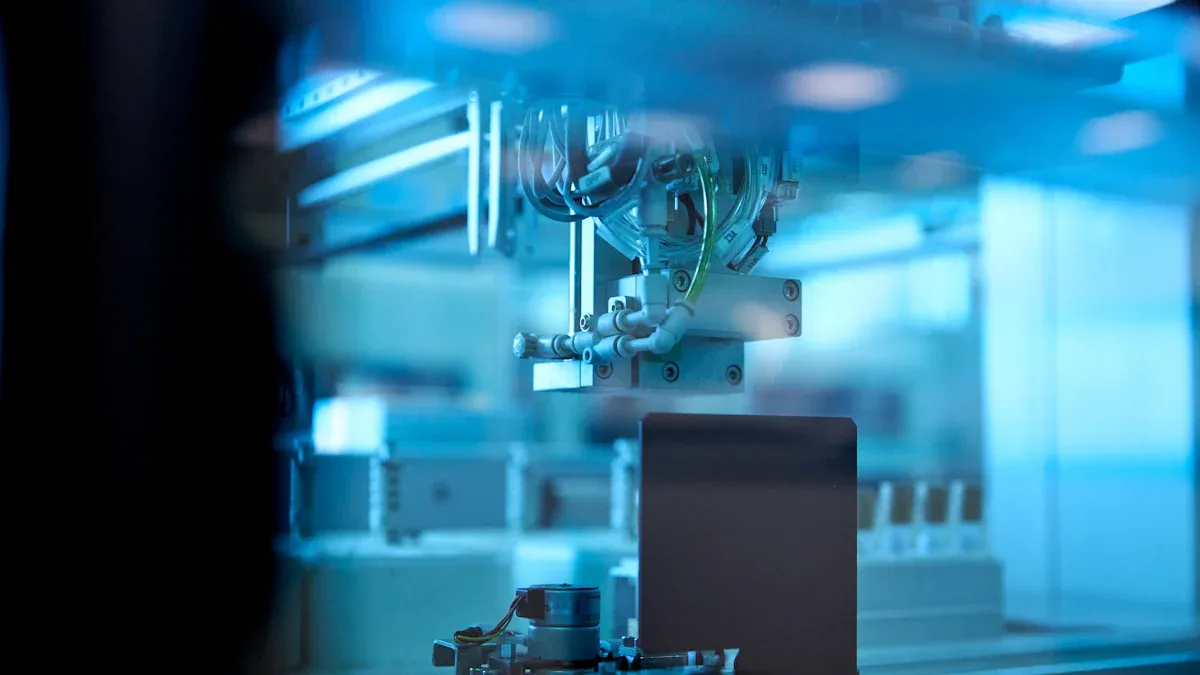How Nickel-Titanium Tubing Enhances Catheter and Implant Performance
Nickel-titanium tubing is revolutionizing how you approach medical devices. Its superelasticity and shape memory properties make it a standout material for creating advanced medical components. These features allow devices to adapt to challenging environments while maintaining precision and reliability. You can see its impact in various medical applications, from catheters to implants, where flexibility and durability are critical. With AccuPath's expertise, you gain access to cutting-edge solutions that elevate patient care and procedural success.
Key Takeaways
Nickel-titanium tubing has special features like flexibility and shape memory. These improve how medical tools work.
Its bendability helps with less invasive surgeries, causing less harm. This also helps patients heal faster.
Nickel-titanium is safe for the body and doesn’t rust. This lowers the chance of problems over time.
It is strong and doesn’t kink, so it works well. This makes it great for catheters and implants.
Unique Properties of Nickel-Titanium Tubing

Nickel-titanium tubing stands out in medical applications due to its remarkable properties. These include shape memory, superelasticity, and biocompatibility and corrosion resistance. Each of these characteristics plays a vital role in enhancing the performance of medical devices, ensuring they meet the demands of modern healthcare.
Shape Memory
How shape memory enables precise functionality in medical devices
Shape memory allows nickel-titanium alloy to "remember" its original form. When deformed, it can return to its pre-set shape upon exposure to specific conditions, such as body temperature. This property is essential in medical devices like stents and guidewires. For example, a stent made from nickel-titanium alloy can be compressed for insertion and then expand to its intended shape once inside the body. This ensures precise placement and functionality, even in complex anatomical structures.
Nickel-titanium alloy's shape memory effect enhances flexibility and adaptability, enabling devices to conform to the body's contours.
This property ensures that medical devices maintain their intended performance, even after being subjected to deformation during procedures.
Benefits of shape memory in minimally invasive procedures
Shape memory is a game-changer for minimally invasive procedures. Devices made from nickel-titanium tubing can be inserted through small incisions, reducing trauma to surrounding tissues. Once inside, they adapt to the body's environment, ensuring optimal performance. This leads to faster recovery times and improved patient comfort. Comparative studies also highlight the superior mechanical behavior of nickel-titanium alloy over materials like stainless steel, making it ideal for applications requiring precision and reliability.
Superelasticity
Role of superelasticity in enhancing flexibility and durability
Superelasticity allows nickel-titanium alloy to undergo significant deformation and return to its original shape without permanent damage. This property enhances the flexibility and durability of medical devices, making them suitable for dynamic environments. For instance, in orthodontics, superelastic wires maintain stable forces, ensuring consistent performance throughout treatment. This same principle applies to medical devices like catheters and implants, where flexibility and adaptability are crucial.
Applications of superelasticity in dynamic medical environments
In dynamic medical environments, superelasticity ensures that devices can withstand repeated stress without compromising their functionality. Research shows that nickel-titanium alloy provides stable and low force levels, making it ideal for applications like vascular stents and orthopedic implants. These devices benefit from the alloy's ability to adapt to the body's movements, ensuring long-term reliability and safety.
Biocompatibility
Why nickel-titanium tubing is safe for long-term use in the human body
Nickel-titanium tubing is bio-compatible, making it safe for long-term use in medical applications. Its biocompatibility and corrosion resistance minimize the risk of adverse reactions, ensuring patient safety. This property is particularly important for implants and other devices that remain in the body for extended periods.
Reduced risk of adverse reactions compared to other materials
Compared to other materials, nickel-titanium alloy offers a lower risk of complications. Its resistance to corrosion ensures that it remains stable in the body's environment, reducing the likelihood of inflammation or rejection. This makes it a preferred choice for critical medical devices, including stents and orthopedic implants.
Applications of Nickel-Titanium Tubing in Catheters

Enhanced Flexibility and Navigation
How Nitinol improves catheter maneuverability in complex pathways
Nickel-titanium tubing plays a vital role in improving catheter maneuverability. Its flexibility allows you to navigate through intricate vascular pathways with ease. This is especially important in procedures involving tortuous or narrow blood vessels. The tubing's ability to bend without breaking ensures that the catheter can reach challenging areas while maintaining its structural integrity. This adaptability makes it a preferred choice for medical applications requiring precision and control.
Benefits for minimally invasive vascular procedures
In minimally invasive vascular procedures, nickel-titanium tubing offers unmatched advantages. Its flexibility reduces the need for large incisions, minimizing trauma to surrounding tissues. This results in shorter procedure times and quicker recovery for patients. Additionally, the tubing's ability to conform to the body's natural anatomy enhances the accuracy of device placement, improving procedural outcomes. By using nickel-titanium-based catheter tubing, you can achieve better results with less patient discomfort.
Durability and Kink Resistance
Resistance to wear and tear during repeated use
Nickel-titanium tubing excels in durability and longevity, making it ideal for catheters used in repetitive procedures. The material withstands repeated mechanical stress without significant wear or deformation. Its corrosion resistance, enhanced by a protective oxide layer, ensures that the tubing remains intact even when exposed to bodily fluids. This durability guarantees reliable performance over time, reducing the need for frequent replacements.
Nickel-titanium resists mechanical stress, maintaining its shape and functionality.
The protective oxide layer prevents corrosion, ensuring safety and longevity in medical applications.
How kink resistance ensures consistent performance
Kink resistance is another critical feature of nickel-titanium tubing. It prevents the catheter from collapsing or folding during use, ensuring consistent performance throughout the procedure. This property is particularly beneficial in dynamic medical environments where precision is essential. By maintaining its shape under pressure, the tubing enhances the reliability of medical devices, giving you confidence in their performance.
Patient-Centric Design
How flexibility reduces trauma and improves patient comfort
The flexibility of nickel-titanium tubing directly benefits patients by reducing trauma during procedures. Catheters made from this material adapt to the body's natural curves, minimizing irritation and discomfort. This patient-centric design not only improves the overall experience but also reduces the risk of complications. You can rely on this tubing to deliver effective results while prioritizing patient well-being.
Faster recovery times due to less invasive designs
Nickel-titanium tubing supports less invasive designs, leading to faster recovery times. Its ability to perform effectively through small incisions means patients experience less pain and quicker healing. This makes it an excellent choice for modern medical devices aimed at improving patient outcomes. By incorporating this material into your catheter designs, you can enhance both procedural efficiency and patient satisfaction.
Applications of Nickel-Titanium Tubing in Implants
Stents and Vascular Implants
How shape memory aids in stent deployment and positioning
Shape memory in nickel-titanium tubing ensures precise stent deployment. When compressed for insertion, the stent regains its original shape upon reaching the target site. This property allows you to position stents accurately, even in complex vascular structures. The tubing's ability to adapt to the body's temperature ensures that the stent expands as intended, providing reliable support to blood vessels. This feature enhances the performance of stents, making them indispensable in modern medical applications.
Superelasticity for adapting to blood vessel movements
Superelasticity allows stents to adjust to the natural movements of blood vessels. This property ensures that the stent maintains its shape and functionality, even under constant stress. Nickel-titanium tubing's ability to withstand deformation without damage makes it ideal for dynamic environments like the cardiovascular system. By using this material, you can ensure that stents remain durable and effective over time, reducing the risk of complications.
Orthopedic Implants
Benefits of Nitinol in bone fixation and healing
Nickel-titanium tubing plays a crucial role in orthopedic implants. Its shape memory property enables devices like plates and screws to conform to the bone's structure, promoting better fixation. This adaptability enhances the healing process by providing consistent support. The material's biocompatibility ensures patient safety, making it a preferred choice for bone repair and reconstruction.
Material adaptability for improved patient outcomes
The adaptability of nickel-titanium tubing improves patient outcomes in orthopedic procedures. Its superelasticity allows implants to adjust to the body's movements, reducing discomfort and enhancing mobility. The material's durability ensures long-term reliability, minimizing the need for replacements. By incorporating this tubing into orthopedic implants, you can achieve better results for patients.
Other Implantable Devices
Examples of innovative uses in surgical implants
Nickel-titanium tubing has expanded the possibilities for surgical implants. It is used in devices like embolic filter frames, guidewires, and novel capture mechanisms. These innovations demonstrate the material's versatility in addressing various medical challenges. Its ability to combine flexibility with strength makes it suitable for a wide range of medical applications.
Long-term performance and safety in implantable devices
The long-term performance of nickel-titanium tubing ensures the reliability of implantable devices. Its corrosion resistance and durability reduce the risk of device failure, enhancing patient safety. The material's biocompatibility minimizes adverse reactions, making it a trusted choice for implants that remain in the body for extended periods. By leveraging these properties, you can create medical devices that deliver consistent and safe results.
Broader Benefits of Nickel-Titanium Tubing in Medical Devices
Reduced Recovery Times
How minimally invasive designs speed up healing
Nickel-titanium tubing supports the development of minimally invasive medical devices. Its flexibility and adaptability allow you to create tools that require smaller incisions. These designs reduce tissue damage during procedures, leading to faster healing. For example, catheters and stents made from this material can navigate complex pathways without causing unnecessary trauma. This means patients experience less pain and recover more quickly, allowing them to return to their daily lives sooner.
Improved patient satisfaction and outcomes
Patients benefit significantly from the use of nickel-titanium tubing in medical applications. The reduced recovery times and lower risk of complications improve overall satisfaction. Devices made from this material also enhance procedural success rates, ensuring better outcomes. By prioritizing patient comfort and safety, you can deliver care that meets the highest standards.
Enhanced Procedural Efficiency
Benefits for surgeons and healthcare providers
Nickel-titanium tubing enhances procedural efficiency by offering properties like superelasticity and shape memory. These features make medical devices easier to handle and more reliable during operations. For surgeons, this means greater precision and control. For healthcare providers, it translates to smoother workflows and fewer interruptions caused by device malfunctions.
Property | Description |
|---|---|
Superelasticity | Allows the material to return to its original shape after deformation. |
Shape Memory | Can change shape in response to temperature, enhancing adaptability. |
Biocompatibility | Safe for use in the human body, reducing complications. |
Flexibility | Enables easier navigation through complex anatomical structures. |
Adaptability | Can be tailored for various medical applications, improving versatility. |
Durability | Long-lasting performance reduces the need for replacements. |
Corrosion Resistance | Maintains integrity in harsh bodily conditions, ensuring reliability. |
Reduced procedure times and complications
The unique properties of nickel-titanium tubing reduce procedure times by simplifying device placement and operation. Its flexibility ensures smooth navigation through anatomical structures, while its durability minimizes the risk of device failure. These advantages lead to fewer complications, allowing you to complete procedures more efficiently and with greater confidence.
Long-Term Cost Savings
Durability reduces replacement costs
Nickel-titanium tubing offers exceptional durability, making it a cost-effective choice for medical devices. Its ability to withstand repeated mechanical stress ensures long-term performance. For example, stents made from this material endure constant blood vessel pulsations without losing their integrity. This reduces the need for frequent replacements, saving you money over time.
Nickel titanium exhibits exceptional durability, making it a reliable material for medical devices that require long-term performance. Its unique atomic structure allows it to withstand repeated mechanical stress without significant wear or deformation. This durability ensures that devices such as stents, guidewires, and surgical instruments maintain their functionality over extended periods.
Fewer complications lead to lower healthcare expenses
The biocompatibility and corrosion resistance of nickel-titanium tubing minimize complications, further reducing healthcare costs. Devices made from this material are less likely to cause adverse reactions or fail prematurely. This means fewer follow-up procedures and lower overall expenses for both patients and healthcare providers.
Corrosion resistance further enhances the material's suitability for medical applications. Nickel titanium forms a protective oxide layer on its surface, which prevents chemical reactions with bodily fluids. This property minimizes the risk of material degradation and ensures the safety of implanted devices.
By choosing nickel-titanium tubing for your medical applications, you can achieve long-term cost savings while delivering high-quality care.
Nickel-titanium tubing, or Nitinol, has redefined medical device performance with its unique properties. Its superelasticity adapts to the body's contours, enhancing patient comfort. Biocompatibility and corrosion resistance ensure safety and durability in long-term use. You can rely on its flexibility and shape memory for complex devices like stents and guidewires. These features improve patient outcomes and procedural efficiency. With AccuPath's expertise, you gain access to cutting-edge solutions that transform healthcare. Nitinol continues to set new standards in medical innovation, offering reliable tools for modern challenges.
FAQ
What makes nickel-titanium tubing unique for medical devices?
Nickel-titanium tubing stands out due to its superelasticity, shape memory, and biocompatibility. These properties allow medical devices to adapt to the body’s movements, maintain durability, and ensure patient safety. AccuPath leverages these features to create advanced tools for healthcare professionals.
How does nickel-titanium tubing improve catheter performance?
Nickel-titanium tubing enhances catheter flexibility and kink resistance. This allows you to navigate complex pathways with ease. Its durability ensures consistent performance during repeated use. These features make it ideal for minimally invasive procedures, improving both efficiency and patient outcomes.
Is nickel-titanium tubing safe for long-term use in the body?
Yes, nickel-titanium tubing is biocompatible and corrosion-resistant. It minimizes the risk of adverse reactions, making it safe for implants and devices that remain in the body for extended periods. AccuPath ensures the highest standards of safety in its nickel-titanium products.
What are the cost benefits of using nickel-titanium tubing?
Nickel-titanium tubing offers long-term cost savings. Its durability reduces the need for frequent replacements, and its reliability minimizes complications. By choosing AccuPath’s nickel-titanium solutions, you can lower healthcare expenses while maintaining high-quality care.
Can nickel-titanium tubing be customized for specific medical applications?
Absolutely! Nickel-titanium tubing’s adaptability allows it to be tailored for various uses, from stents to guidewires. AccuPath specializes in creating customized solutions to meet the unique needs of healthcare professionals and their patients.
💡 Tip: Contact AccuPath to explore how nickel-titanium tubing can elevate your medical device projects.
See Also
Understanding Nickel Titanium's Role in Healthcare Innovations
Why NiTi Tubes Are Revolutionizing Medical and Aerospace Fields
Current Developments in Nickel Titanium Alloy Applications
Recent Innovations in Etched PTFE for Catheters
Advancements in Laser Cutting Technology for Nickel-Titanium Tubes

